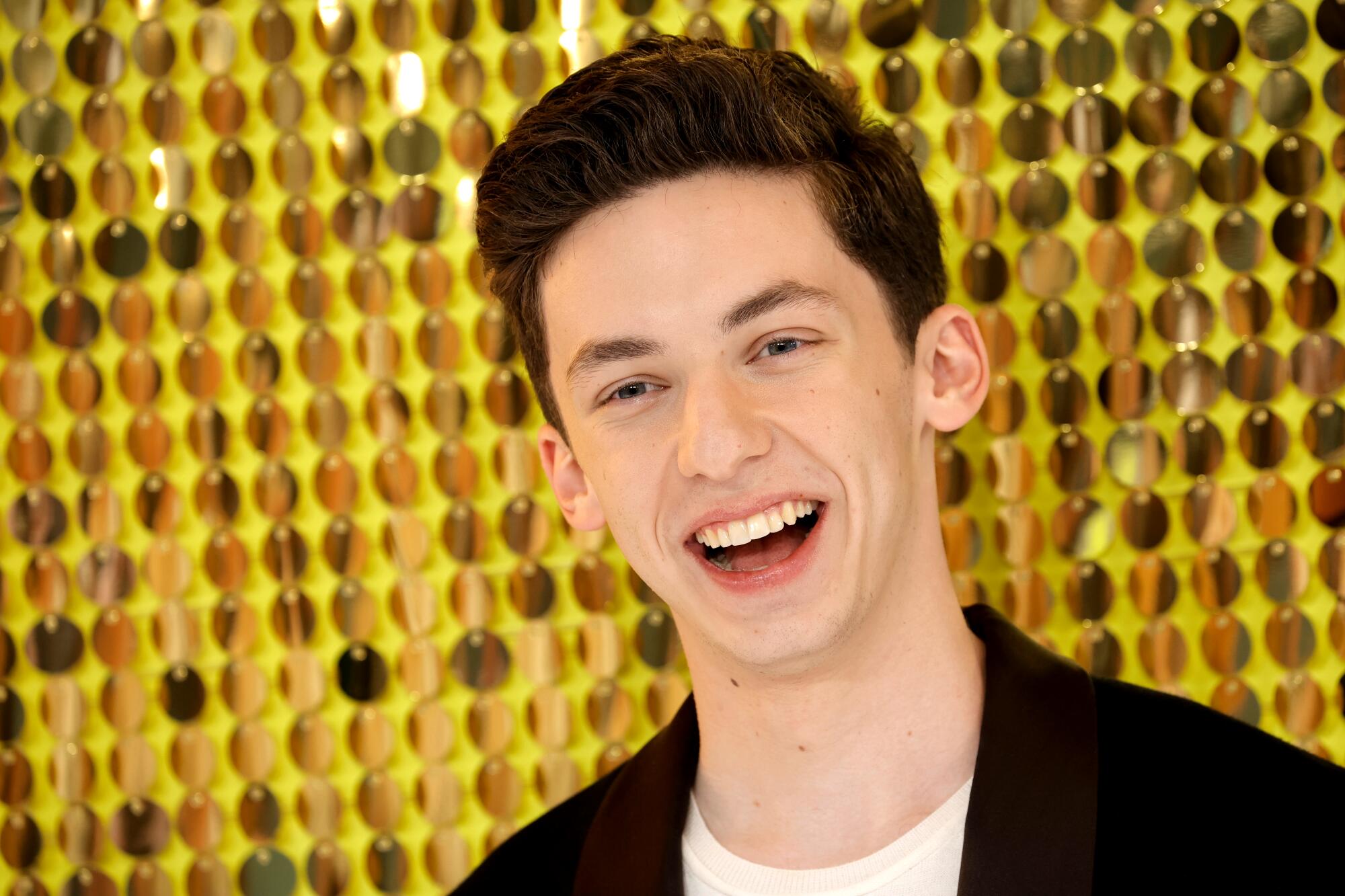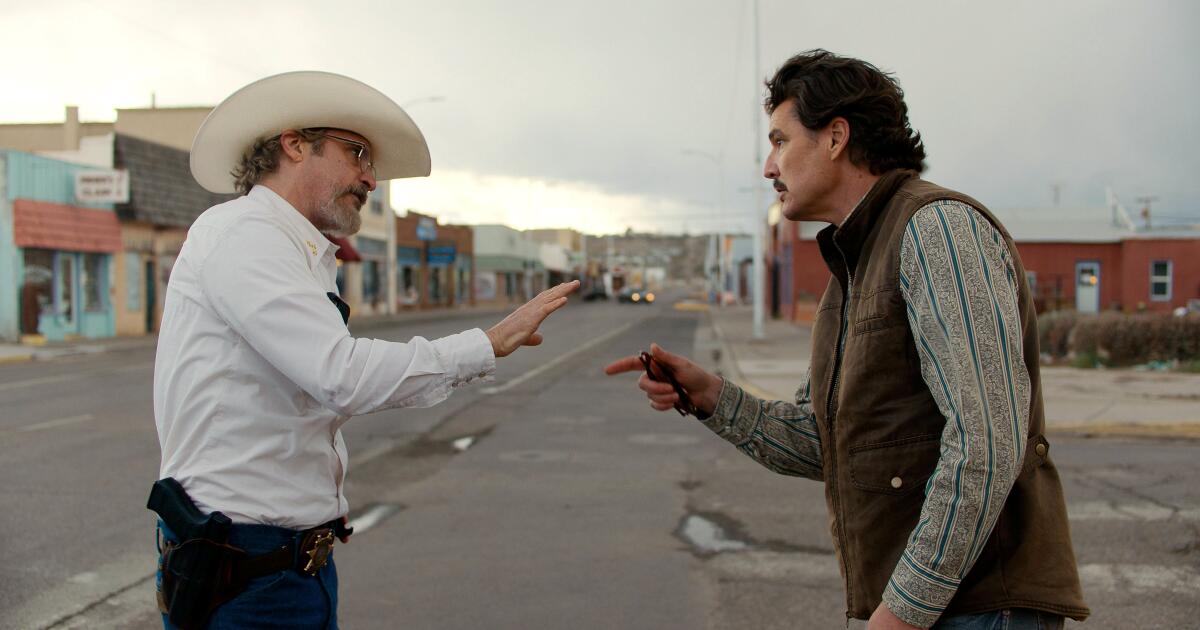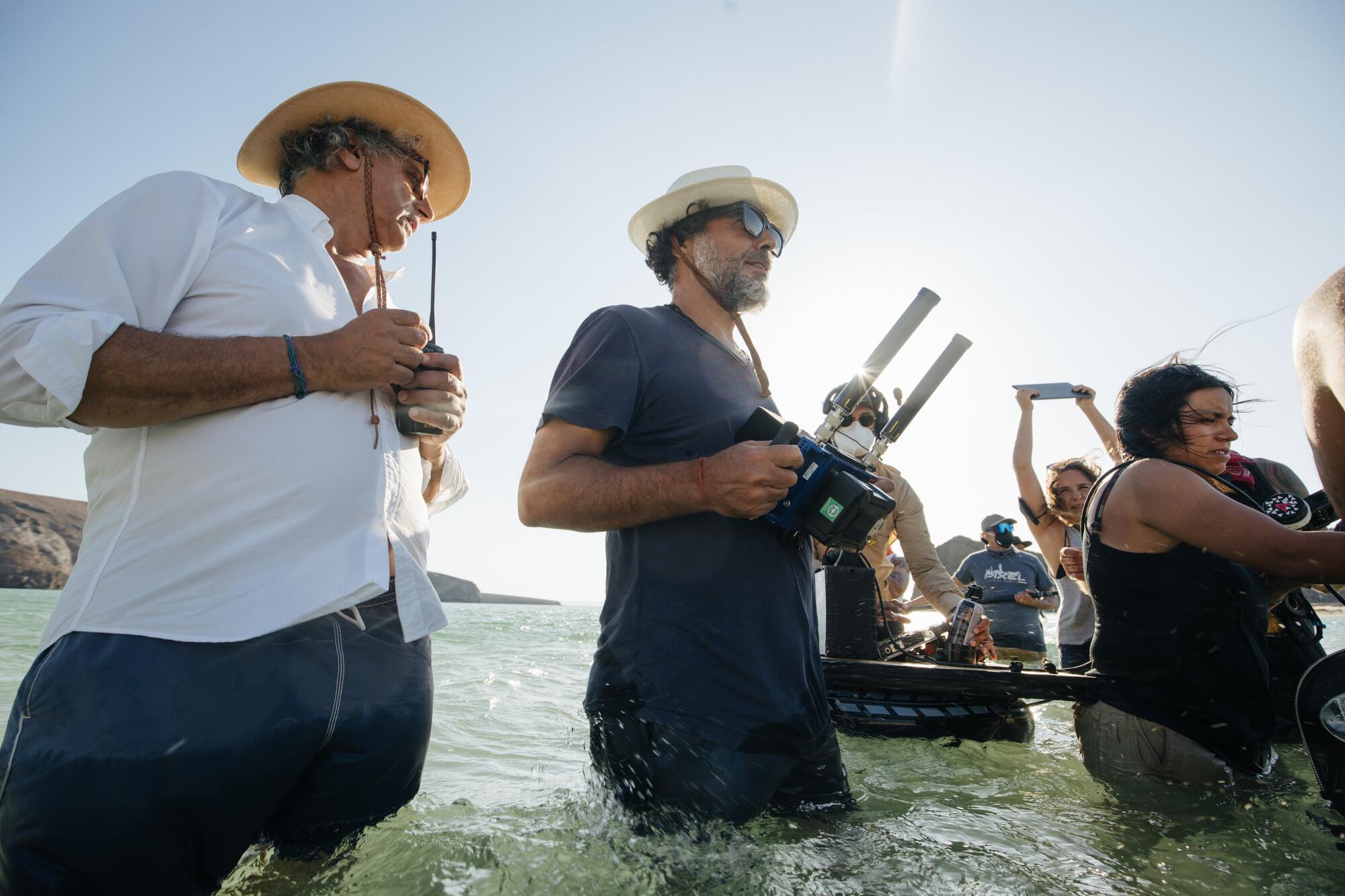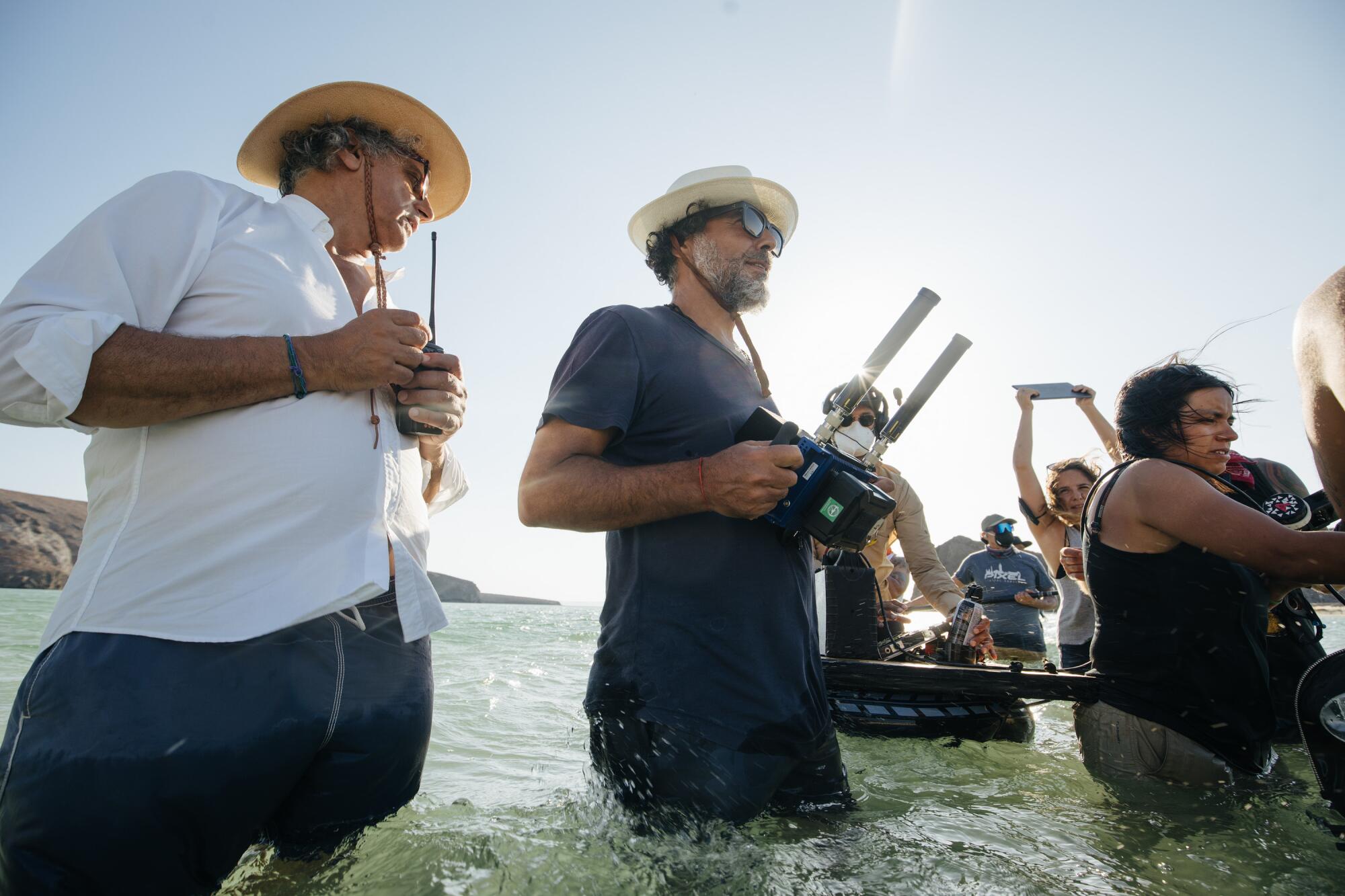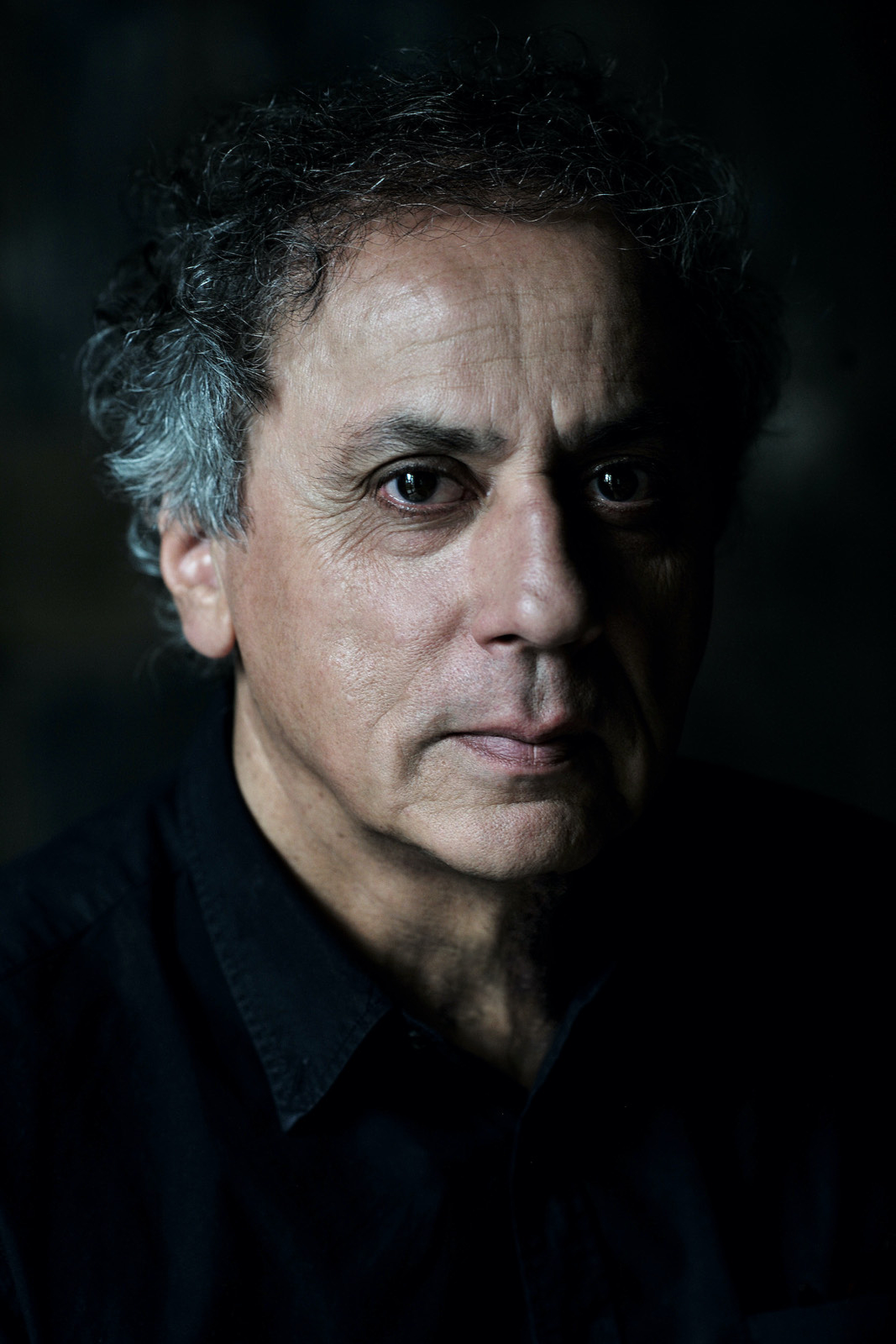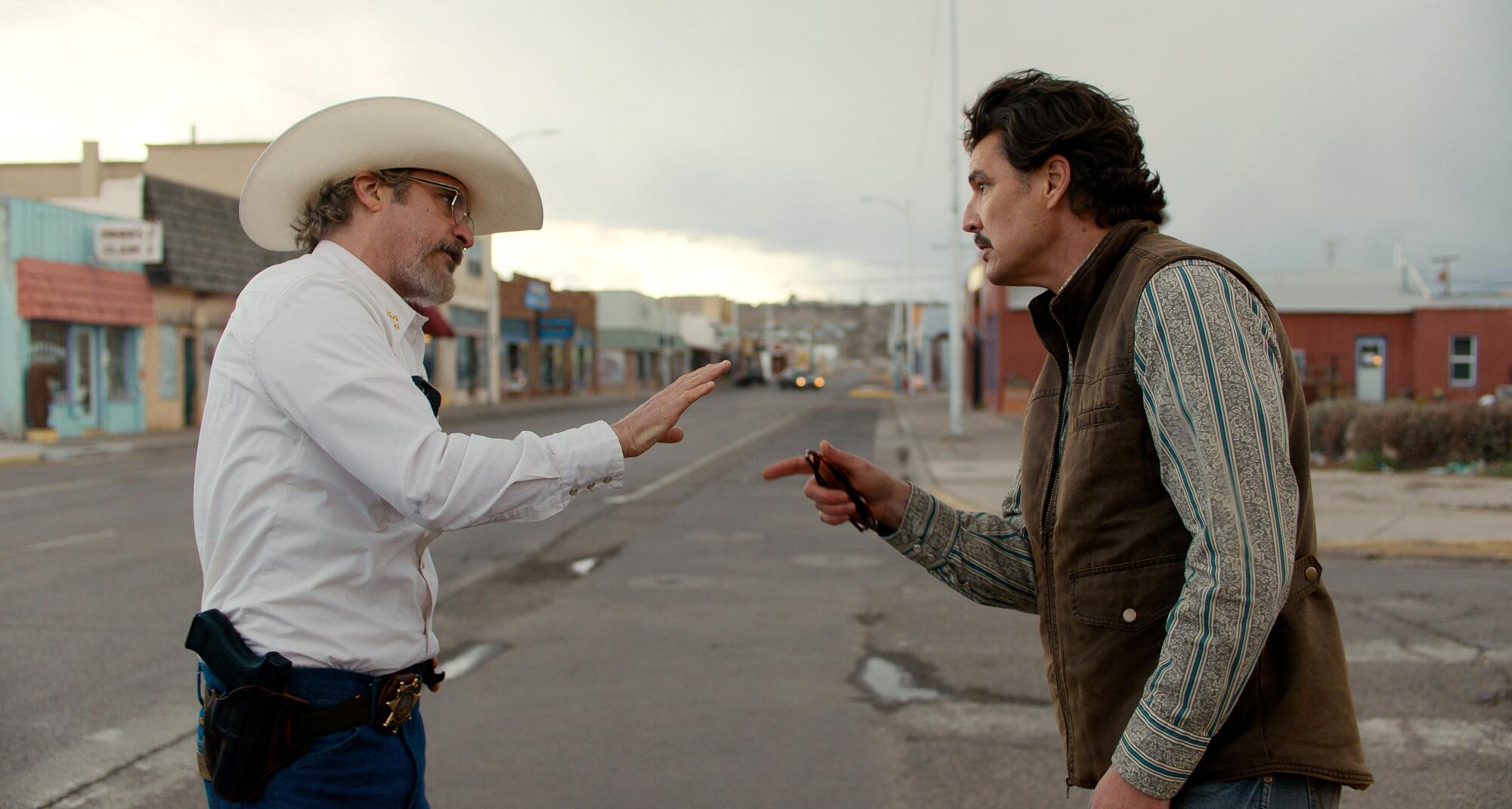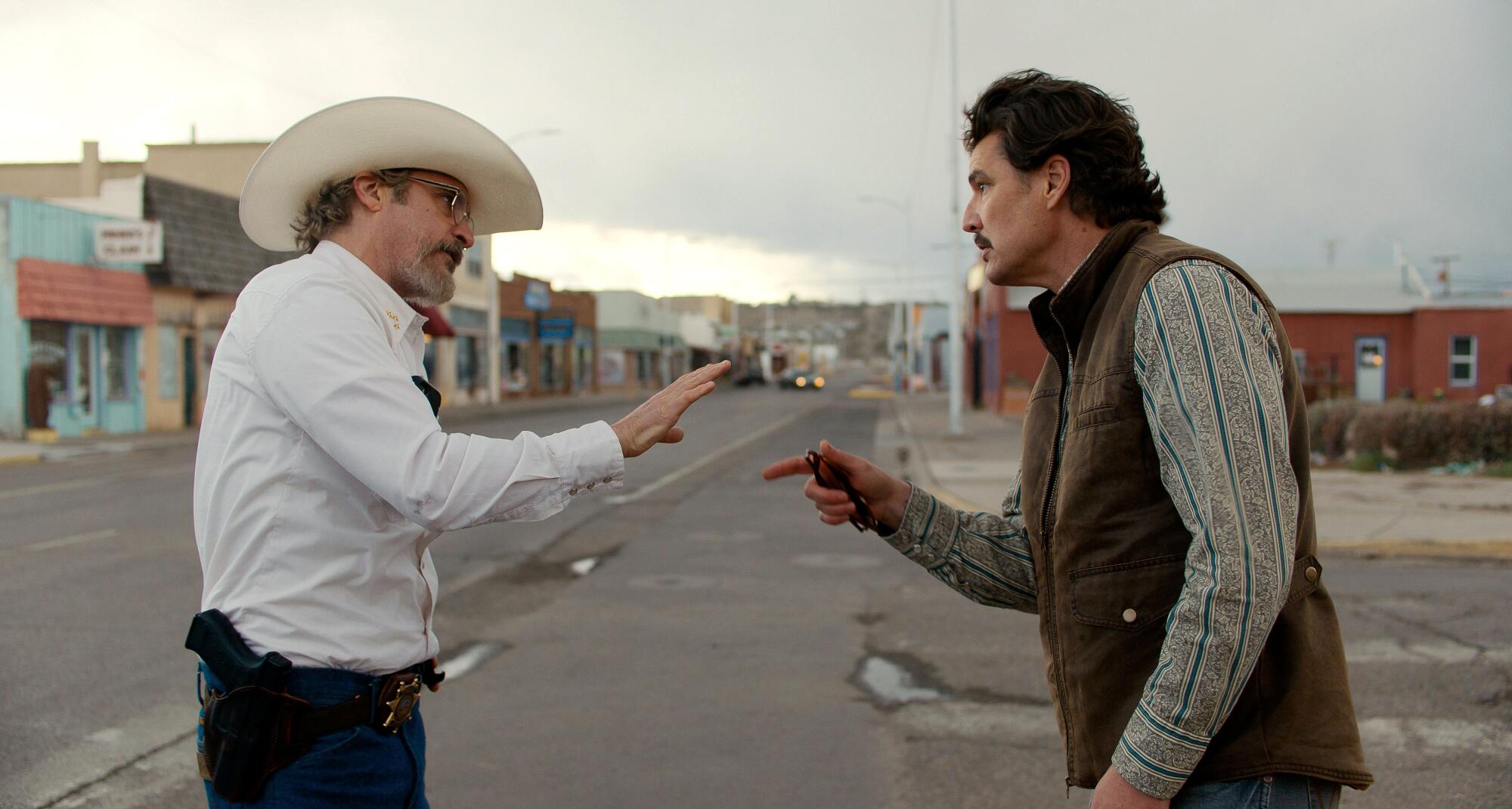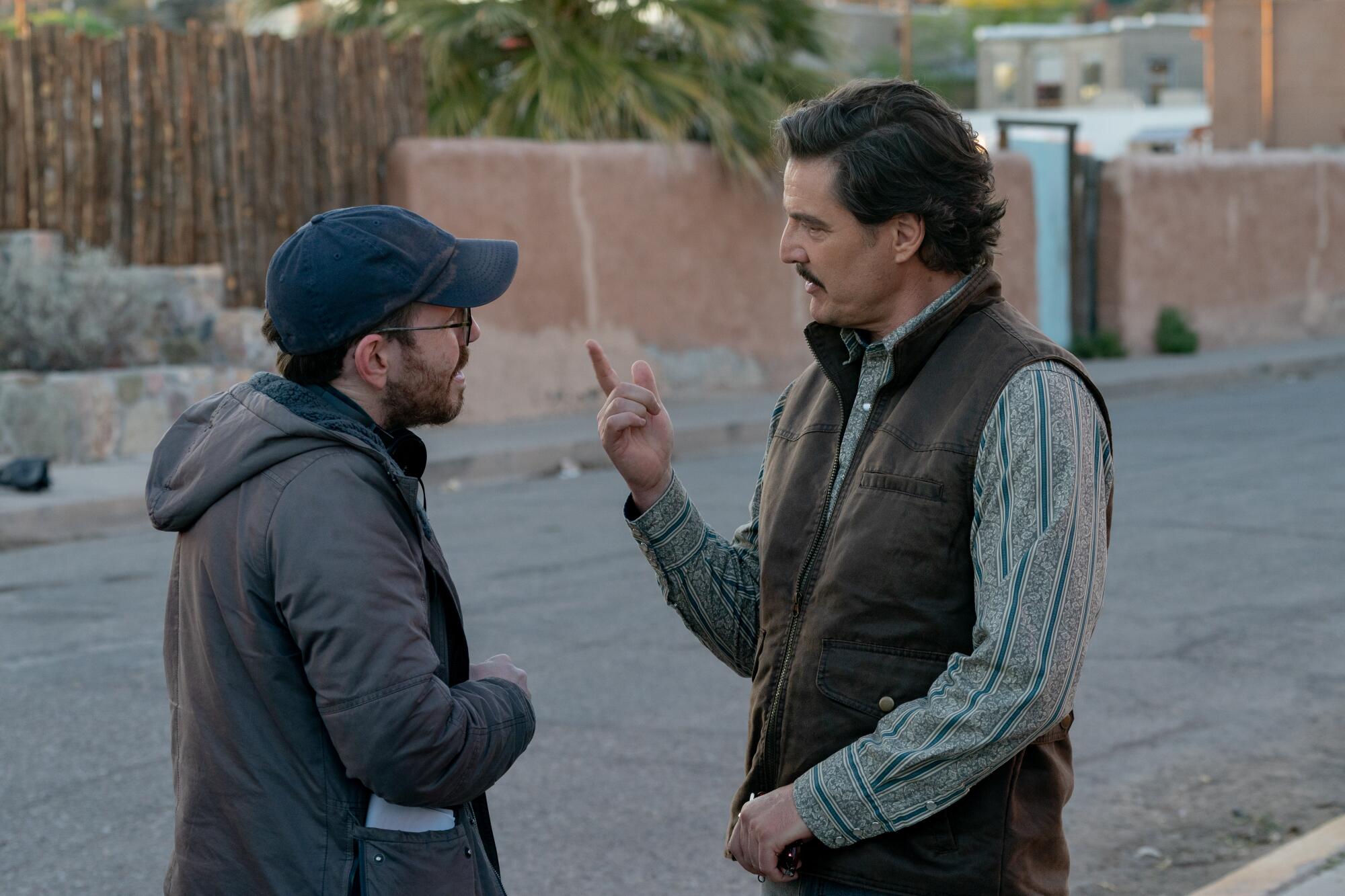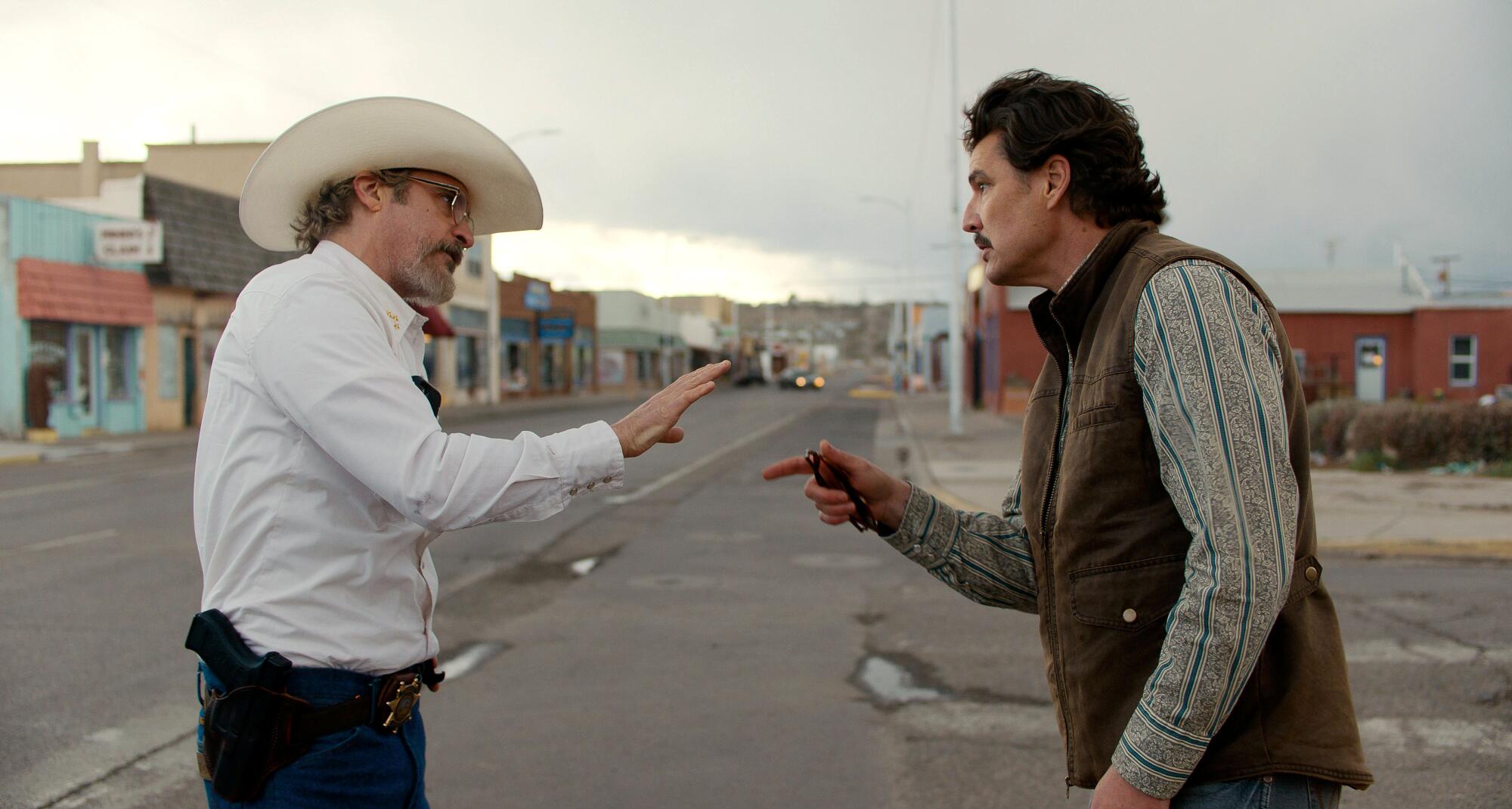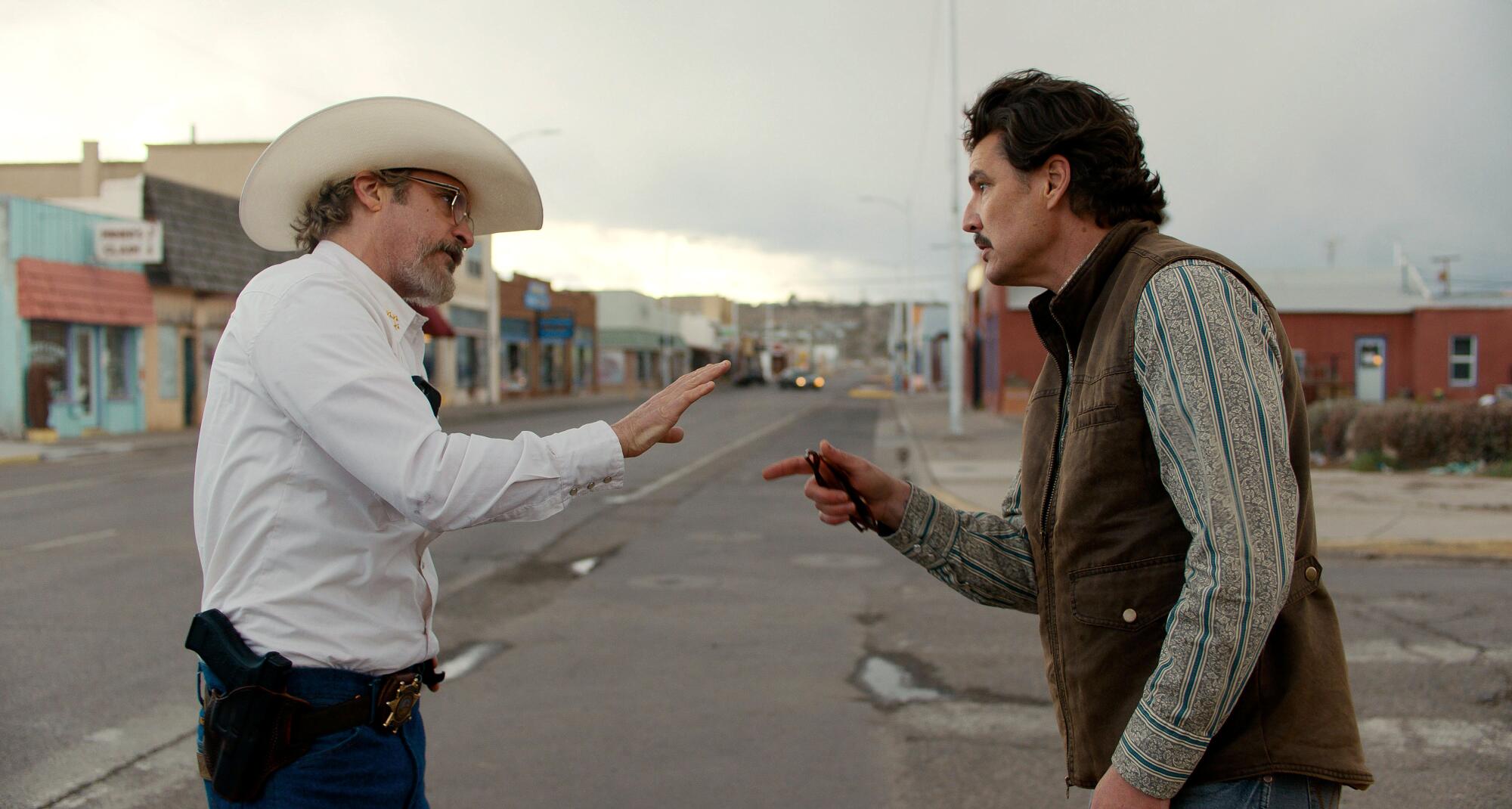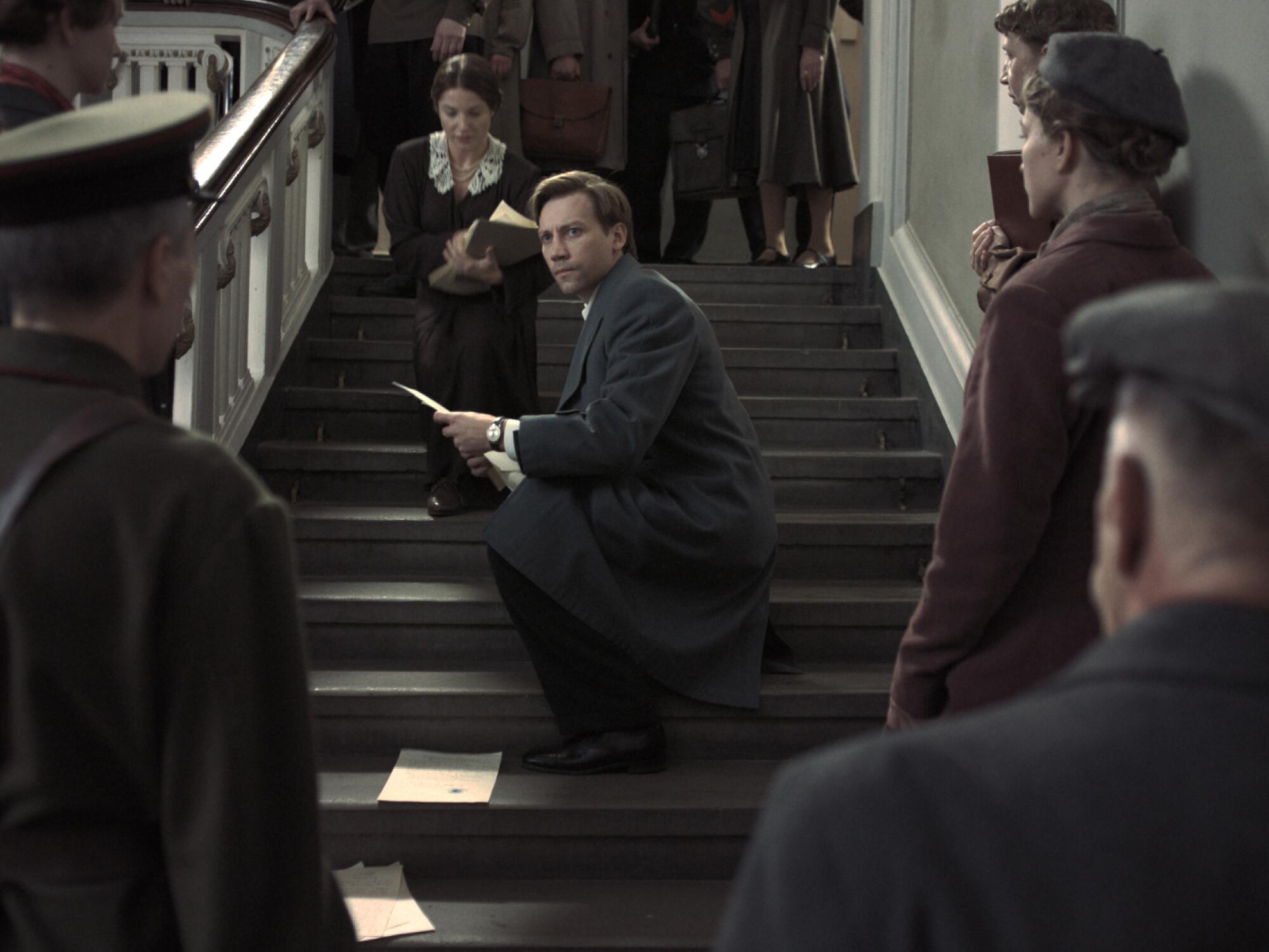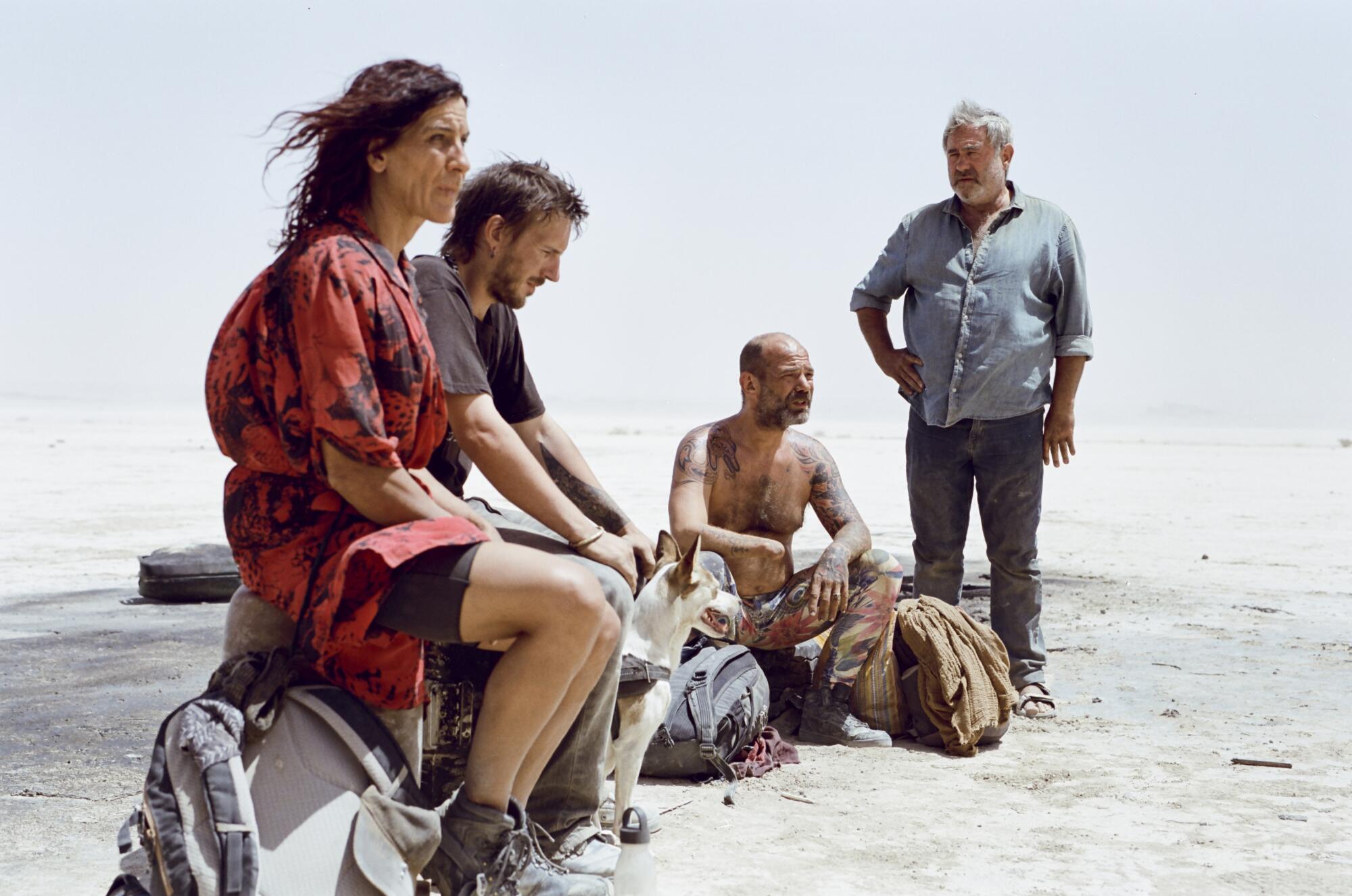Cooper Hoffman and Andrew Barth Feldman bring banter to ‘Poetic License’
When actor Cooper Hoffman pops up on a Zoom window for a joint interview, Andrew Barth Feldman practically bursts with joy.
“Oh my God,” Feldman exclaims. “Look at the buzz!”
The two friends, each in their own apartments in New York City, have not seen each other since Hoffman recently returned from Italy where he was shooting a role in Luca Guadagnino’s upcoming movie about the artificial intelligence company OpenAI, his hair styled in a severe, dark buzz cut.
The pair immediately launch into a spirited, rhythmic back-and-forth, playfully bouncing around ideas, making jokes and finishing each other’s sentences. It is similar to the nonstop banter between their duo in “Poetic License,” which has its world premiere at the Toronto International Film Festival tonight.
The first feature film directed by Maude Apatow, best known for her role on TV’s “Euphoria,” the film stars Apatow’s mother, Leslie Mann, as Liz, a woman who recently moved to a college town after her husband (Cliff “Method Man” Smith) joined the faculty there. Auditing a poetry class, Liz meets Ari (Hoffman) and Sam (Feldman), two awkward yet compellingly charming best friends who soon find themselves competing for her attention and affection.
Written by Raffi Donatich, the film is the first from Jewelbox Pictures, Apatow’s production company founded with her friend Olivia Rosenbloom, and comes into the festival still seeking distribution. (Keeping things in the family, the debuting director’s father, Judd Apatow, is a producer on the film as well.)
Via email, Maude Apatow spoke about the challenge of finding two actors who could not only play their individual roles, but also capture the speedy dynamic between them.
“A lot of the movie relies on the chemistry between Ari and Sam, so finding the perfect combo was massively important to me,” Apatow, 27, said. “After auditioning countless other boys, Andrew and Cooper were at the top of my list. … They were electric.”
Hoffman, 22, the son of late actor Philip Seymour Hoffman and director-producer Mimi O’Donnell, first burst to attention with his starring role in Paul Thomas Anderson’s 2021 “Licorice Pizza.” He can also be seen in the new Stephen King adaptation “The Long Walk,” which opens next week, and he has a role in Gregg Araki’s upcoming “I Want Your Sex.”
Feldman, 23, stepped into the title role of “Dear Evan Hansen” on Broadway at age 16, younger even than the adolescent title character. He also starred opposite Jennifer Lawrence in the 2023 comedy “No Hard Feelings,” in which his torchy showstopping performance of Hall & Oates’ bouncy ’80s “Maneater” has since racked up more than 18 million views on YouTube.
My conversation with the two actors took place on Labor Day. The following day Feldman began his nine-week run in the Tony-winning musical “Maybe Happy Ending.” Though playing the role of a robot, his casting, replacing the half-Filipino actor Darren Criss, sparked controversy and conversation around Asian representation on Broadway.
“It’s been the most vulnerable time of my whole entire life,” said Feldman of the response to his being cast in the show. “And I have much I want to say and for now the only place I really can is the show. I’m saying everything that I want to say, everything that I believe, I’m pouring my whole heart into the show itself. And I’m thankful that the conversation that’s been happening is happening. And I think this is my way of being part of it.”
“And one day we’ll have a much bigger conversation about it,” he adds, carefully. “But right now, I’m more excited to be talking about ‘Poetic License’ and anything would be reductive to the conversation to talk about it in this context. I don’t think it’s up to me to try to change any minds about it, only to do the best job I possibly can at uplifting this gorgeous, perfect story. Everything that I have to say for the time being is in the show. The show holds all of it.”
Feldman will miss three performances of the show over the weekend due to being in Toronto for the premiere of “Poetic License.”
Did the two of you meet making Jason Reitman’s “Saturday Night?”
Andrew Barth Feldman: Boy, did we.
Cooper Hoffman: We also got this job [“Poetic License”] on “Saturday Night.”
Feldman: So here’s the story. We’ve been preparing to tell it for so long. And this is what happened: We became really fast, really close friends on “Saturday Night” and that was a huge cast of a lot of people who are still huge parts of both of our lives. But we clicked really instantly.
And I was taping for this movie and Cooper was taping for this movie, and we both loved the script and, especially on that set, everyone was taping for all of the same things all of the time. So I got a call from my agent that they were asking me to chemistry-read with Cooper and since we were in the same place, might as well be convenient if we just do it in the same place on Zoom. Cooper was on his way to hanging out with me at Dylan O’Brien’s Airbnb. I was already there and Cooper’s on his way. So I called him, told him that this was happening. That’s how he found out that we were chemistry-reading together. And I think both of us said, “Oh, we got the job.” Like, that’s it. As soon as they see what we do when we’re alone together and how insane it is, we’ll have this job. And that’s how it happened.
Hoffman: It’s so true. We ended up running the lines with Dylan O’Brien playing — I don’t know why we keep using his full name — but Dylan playing Leslie Mann’s character. Dylan played Liz.
Feldman: He was really good. I was kind of hoping he would do it.
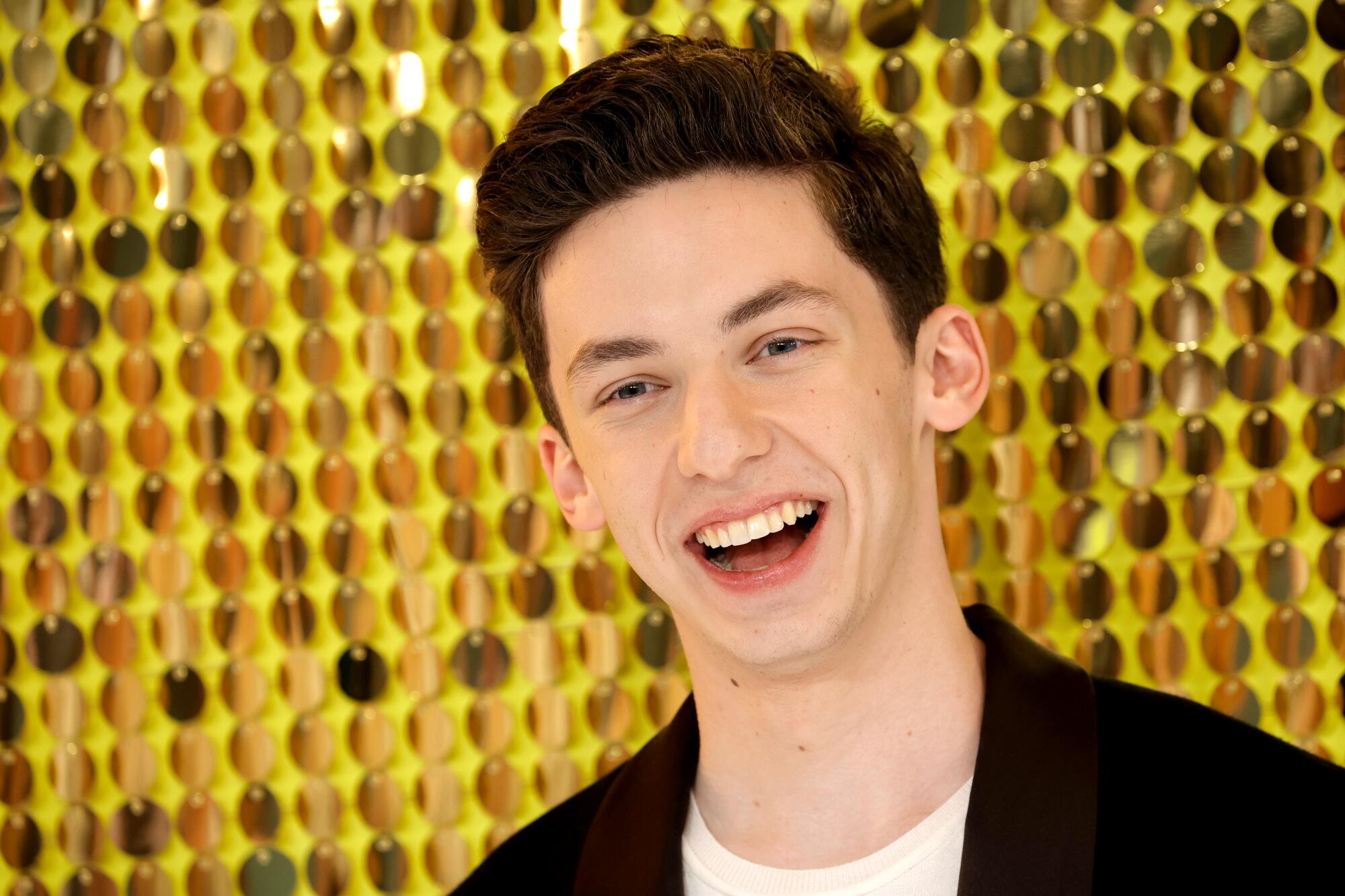
Andrew Barth Feldman, attending the London premiere of “No Hard Feelings” in 2023.
(John Phillips / Getty Images for Sony Pictures)
Why do you think the two of you just clicked like this?
Feldman: Why do you love who you love? I think there are a lot of real similarities to us. We both had losses of parents really early on in our lives. And that I think instantly brought us to a level of vulnerability with each other that we didn’t necessarily have with other people. But in terms of the candor and the rhythm that we have with each other, it’s just kind of feels like one of those universe once-in-a-lifetime things.
Hoffman: I would very much agree. It was one of those weird things where, as we had to play best friends, we were kind of figuring each other out. Andrew was always someone that I felt very comfortable talking to about things. We rarely would talk about the movie. It was much more about life and other things. And I feel very privileged to have shot this movie with Andrew, actually.
There is something really fresh about your dynamic. The best I can describe the movie is that it’s an adult coming of age rom-com of male friendship.
Hoffman: I would say that’s better than anything that we would say. To me, the thing is that I love a male friendship. I love a male friendship that almost feels like they’re dating, they’re one step away from being married. And what does that bring? What happens when you rely on someone so heavily?
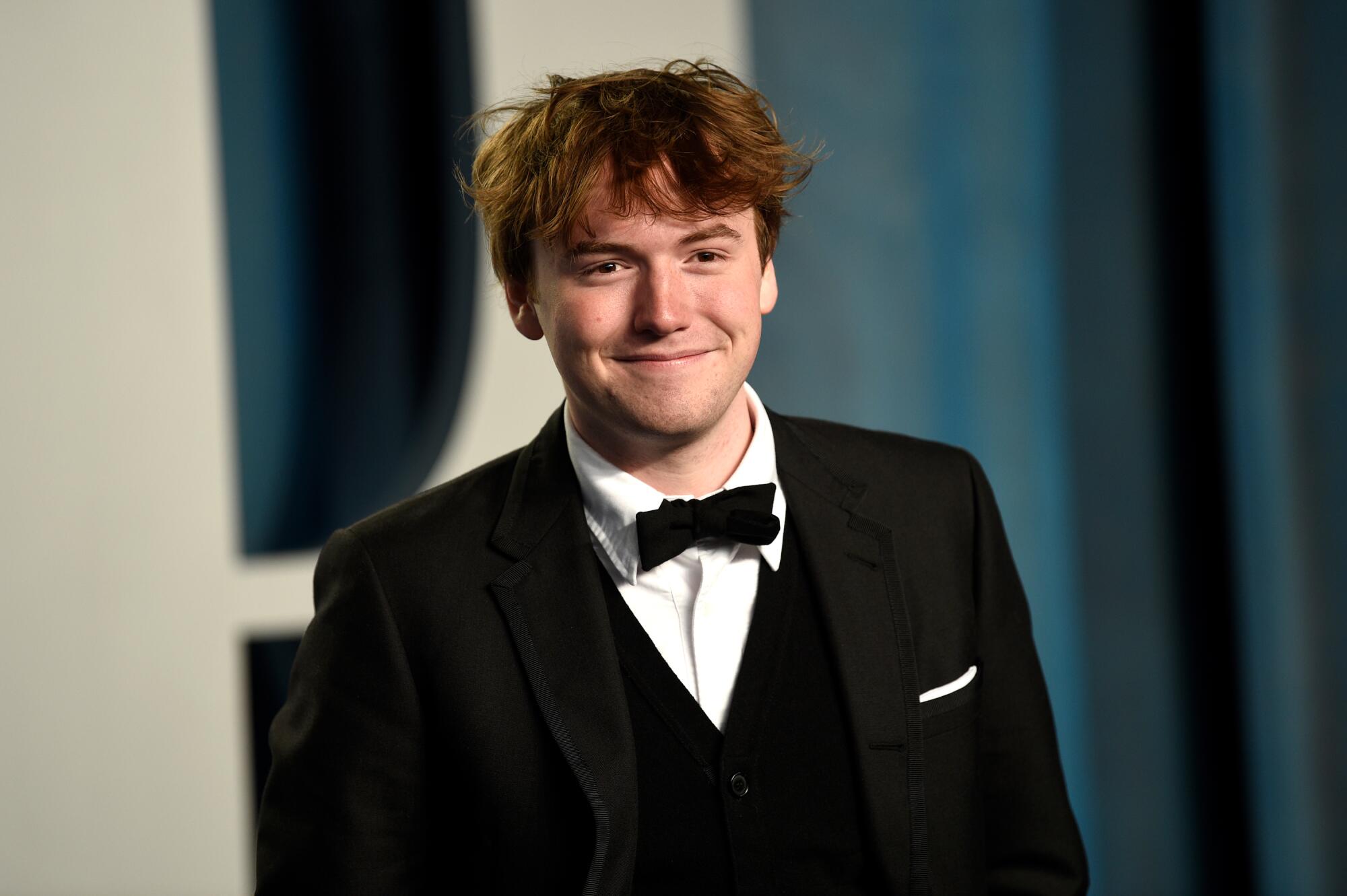
Cooper Hoffman arrives at 2022’s Vanity Fair Oscar Party in Beverly Hills.
(Evan Agostini / Invision / AP)
Feldman: I feel like we both had relationships growing up that you’re basically zero degrees away from romance. It is a romantic relationship. And that is — or was, I guess? — formerly maybe more taboo. There are more expectations of masculinity around that. But I think especially in our generation and especially as people who have decided to do art with our lives, there’s really no taboo around it at all. And in fact, something to be really celebrated. It is kind of the healing factor for young men right now: male relationships that you can be really vulnerable in.
And besides being Sam and Ari’s relationship, it was — and is — Cooper’s and my relationship. We couldn’t shut up really. I mean, that’s important to note is that we never, ever stopped talking. We would be talking and talking and then somewhere during our conversation we would hear action be called and we would just keep talking until we found our way into the scene. Kind of the way we did the whole movie was just trying to tell as much truth as possible because we knew that our relationship was all that really needed to be there to make the relationship of the characters work.
Hoffman: I also just had a thought that this interview’s going to be so annoying to read because it’s literally just going to be me and Andrew complimenting each other for however long. You should have never put us on a call together.
Feldman: This is our first interview about this.
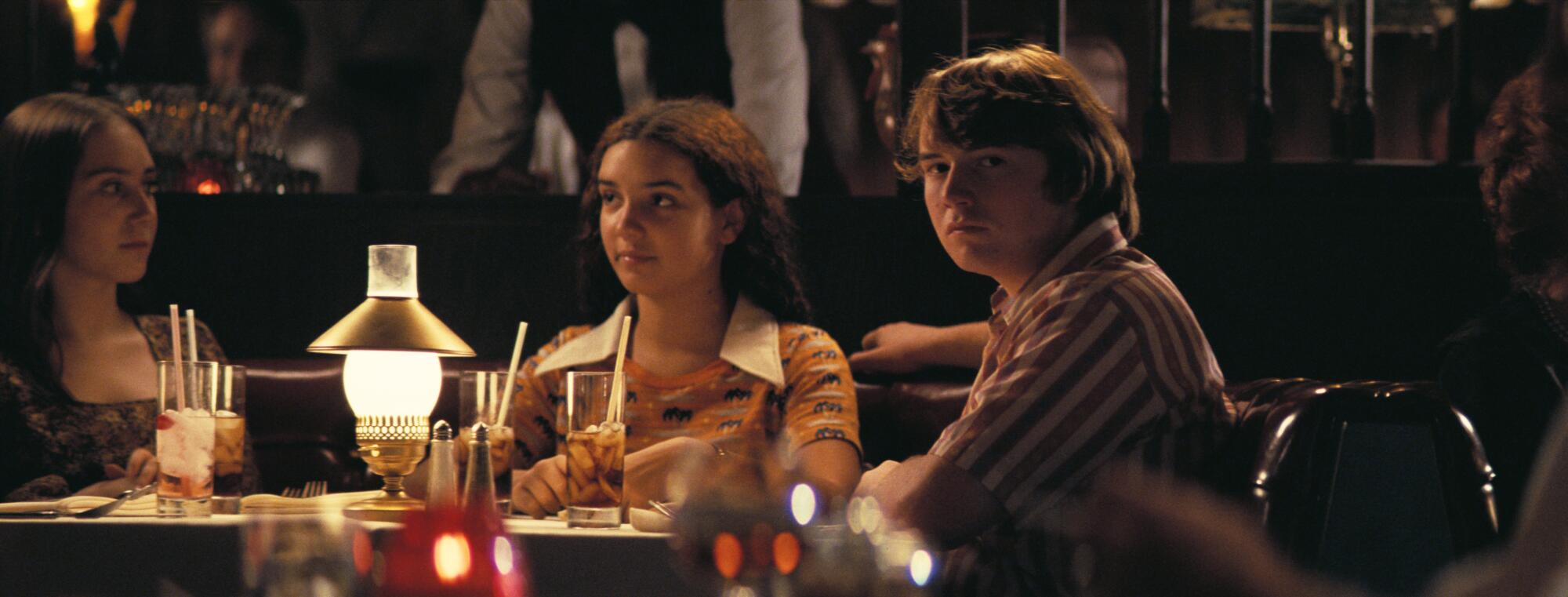
Cooper Hoffman in Paul Thomas Anderson’s 2021 movie “Licorice Pizza.”
(MGM/UA)
How did the two of you find working with Maude? On the one hand, this is her feature directing debut. On the other hand, she’s been on movie sets her whole life.
Feldman: She was really good. In all of those moments of improvisation and exploring, she was a massive collaborator in that. And was pushing both of us to places that I wouldn’t have gone initially, risky places in these scenes. Every time we would shoot something, we’d do it, go away and talk about it for 10 minutes and just be inventing and zip-zap-zopping across the three of us, and then just be like, OK, let’s go get another one. It was this really creative process that for me as a young person coming up in this industry, I haven’t really had permission to participate in up until working with somebody like Maude. She’s not too much older than us. We’re all coming at this as collaborators as opposed to hierarchically.
Hoffman: The thing with Maude is there was a real level playing field in which we were all figuring out this thing together. And Maude just has inherently very good instincts as a director. She was grounded and she knew what she wanted, but she was much more open for us to go, “Hey, we don’t know what this is. Can we figure this thing out?” And it was debatably the most collaborative set I’ve been on. Which was really great that Maude allowed for that space to happen.
Cooper, do you see your character here as an extension of what you were doing in “Licorice Pizza”? It’s this guy who outwardly has a lot of game, but then inwardly is struggling. Did it feel that way to you as you were performing the role?
Hoffman: No. And here’s the reason for that, I’m not opposed to that convo but I think a real fear of an actor is that you’re doing the same thing every time. And so I think I’m inherently going to jump to being like, “No, this is a completely different person.” And the thing is, I don’t think Ari has game. I never wanted to play it like that. I think he’s extremely confident, but, not to bring up Dylan O’Brien again but Dylan O’Brien used a very good metaphor, which is you’re like a duck. It’s calm on the surface, paddling vigorously underneath. And it does feel like that for Ari.
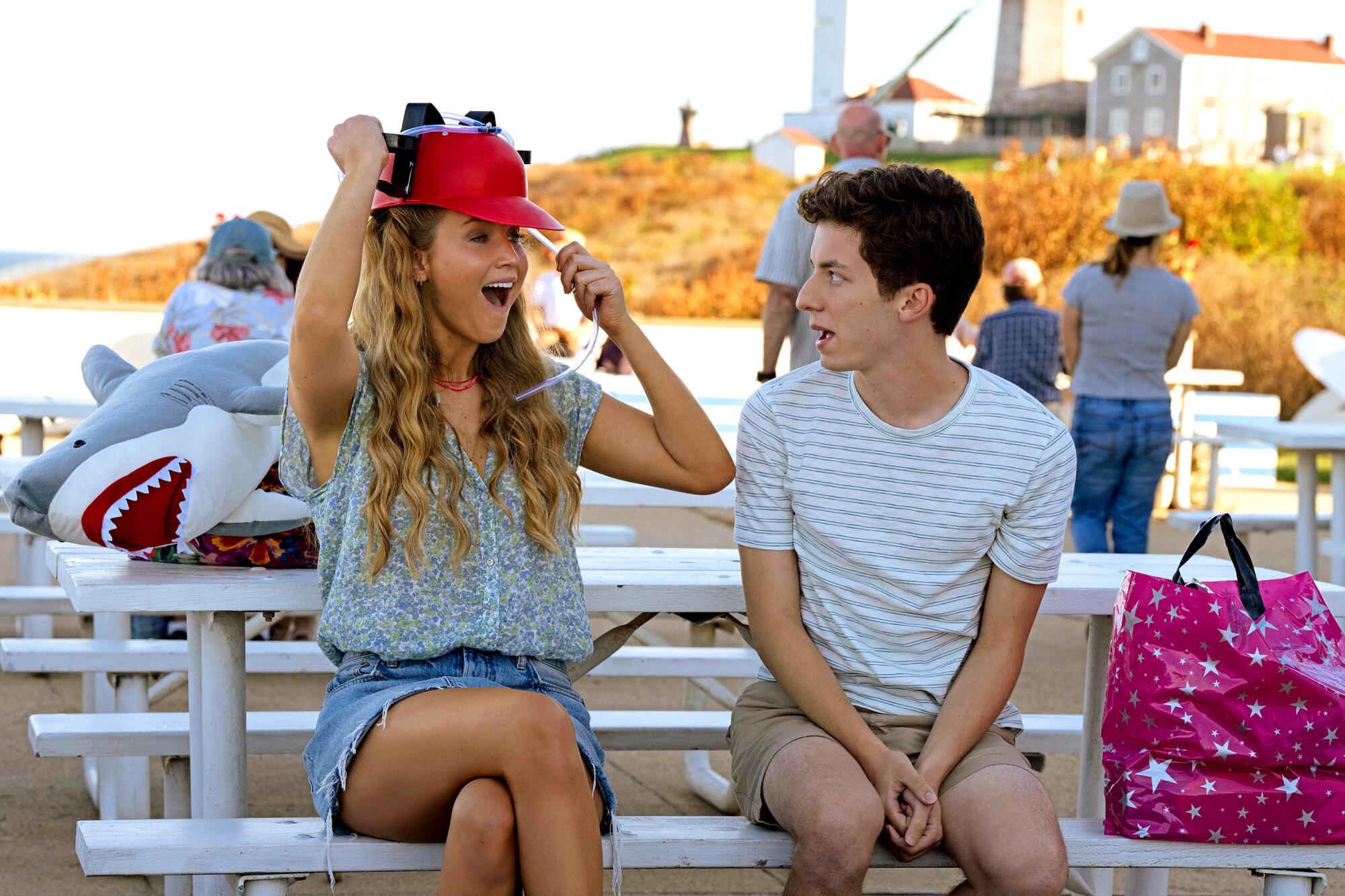
Andrew Barth Feldman with Jennifer Lawrence in a scene from “No Hard Feelings.”
(Macall Polay / Sony Pictures)
Andrew, you have your own background in musical theater, but you also had your rendition of “Maneater” in “No Hard Feelings.” Do people now always want you to do a number in a movie? Was there any discussion of you doing a number in this one?
Feldman: There was very briefly a discussion of me doing a number in this movie. I think I was talking to Raffi early on and she was like, “Oh my God, I had this idea, what if you actually sing this thing?” And I was like, I can’t do another one. Not right now. It’s too soon after “Maneater” and “Maneater” is still a really huge part of my life. I want to give that moment its moment.
What do you mean, that “Maneater” is still a big part of your life?
Feldman: People ask me to sing it all the time.
Hoffman: What do you mean? It’s a masterpiece. I watched it on a plane the other day. I cried. I literally cried. I love that scene so much. I love that movie so much.
Guys, thank you for your time. I can’t even imagine how this would’ve worked if I’d interviewed you separately.
Feldman: We wouldn’t have done it.
Cooper: I would’ve just talked about Andrew the whole time. By the way, if you would’ve gotten us in the room together, this interview would’ve never ended. It would’ve been physical bits. It would’ve been a whole thing.
Feldman: We talked on set so much about these moments — that we would get to eventually do press together and talk about the movie because we really were, from the beginning, giving one performance of these two characters together.
